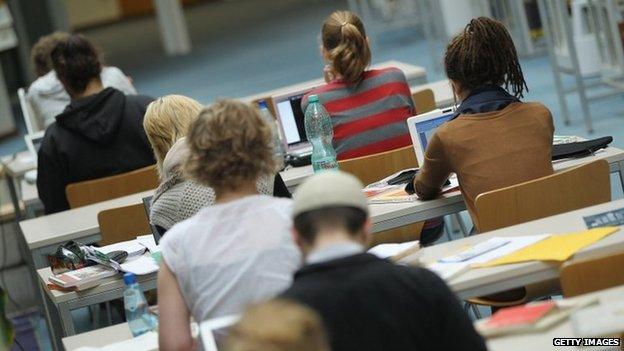Scottish independence: Higher education only safe with 'Yes' vote, say academics
- Published

The academic group said cuts in UK public spending were threatening students in Scotland
Independence is the only way to secure free higher education in Scotland, a group of academics has said.
Members of the pro-independence Academics for Yes group attacked what they called "marketised" higher education elsewhere in the UK.
They argued independence was the best way for Scotland to avoid the imposition of tuition fees on students.
Last year senior academics claimed a referendum "Yes" vote threatened scientific research in Scotland.
Ahead of the 18 September referendum, about 60 academics signed up to the new pro-independence group, including Prof Bryan MacGregor, of Aberdeen University, and Glasgow University's Prof Murray Pittock.
Launching the group in Glasgow, they said: "The SNP government is strongly committed to science and universities, seeing them not only as a beacon of status internationally, with five of our universities in the top 200 worldwide, but also as engines of economic growth and international co-operation."
They continued: "Abolition of tuition fees and expansion of funded places linked to social justice and widening participation show a commitment to inheritance of a democratic intellect at odds with the increasingly marketised state of higher education provision elsewhere in the UK."
The group said a "No" vote in the referendum would put Scottish universities at risk from UK public spending cuts and the policy of charging students in England up to £9,000 per year to study.
"The main threats from 'No' are cuts in the Scottish block grant, loss of access to EU funding and overseas goodwill", the academics said.
"Relentless reduction in public spending, current pressures to reduce university support in England even more and privatisation of English universities through fees will lead to reductions in the Barnett formula for public funding in Scotland."
The UK government allows universities in England to charge up to £9,000 per year for undergraduate courses. Scotland does not charge fees to Scottish students, but those from elsewhere in the UK can be charged up to £9,000.
Wales and Northern Ireland have capped the amount their students pay at £3,465 a year.
Academics for Yes said they were concerned the current arrangement may not last.
Currency 'advice'
"Devolution provided some temporary relief from policies developed elsewhere in the UK; only independence can protect us in future and allow us to flourish," they said.
Last November Prof Hugh Pennington of Aberdeen University, a member of the pro-union Academics Together, said devolution was delivering for Scotland's universities.
A spokesman for the pro-Union Better Together campaign said of Academics for Yes: "Perhaps this new group will be able to advise the first minister on how to come up with a Plan B on currency."
On 18 September voters in Scotland will be asked the Yes/No question: "Should Scotland be an independent country?"
- Published5 February 2014